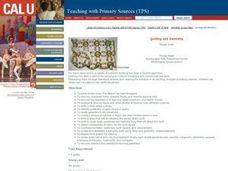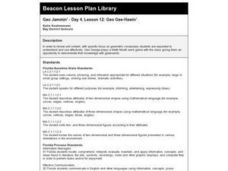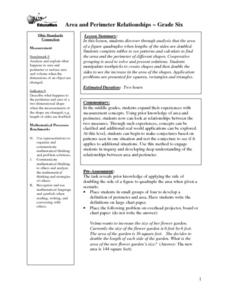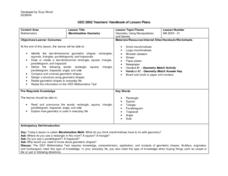Curated OER
Geometry and Quilting
Students create a quilt square for a class quilt using at least three, two-dimensional geometric figures. They research and write a brief description of at least two different quilt patterns that they find. Pupils discuss that quilts are...
Curated OER
A World of Symmetry
Students identify lines of symmetry. In this symmetry lesson, students create objects and identify their lines of symmetry. They answer questions about lines of symmetry. Students cut shapes out of cookie dough and...
Curated OER
Protein Puzzles
High schoolers examine the concept of protein structure. They read an article, construct a three-dimensional model of an insulin protein, take a quiz, conduct Internet research, and answer discussion questions.
Curated OER
Slimy Cells
Students create three-dimensional cell models. They may choose to make either a plant or animal cell but must use a Ziploc bag as the cell membrane, slime for the cytoplasm, and strawberry baskets for the cell wall if making a plant...
Youth Education Services
Relating Volume in 3D Objects with Ten Problems
A fabulous four-page assignment explores volume formulae for rectangular prisms, cylinders, cones, and pyramids. Pupils apply the formulas to solve problems, match diagrams to values, and address real-world scenarios. A detailed answer...
Curated OER
Earth's Rotation
Fourth graders investigate the Earth's rotation. In this Earth's rotation instructional activity, 4th graders realize that the rotation of Earth causes the days and nights on Earth. Students break into groups and use a flashlight and...
Curated OER
Flag fun
First graders develop an understanding of the importance of the flag. In this flag lesson, 1st graders research the history of the flag. Students understanding of how the flag fosters pride in Americans. Students research the...
Curated OER
Volume of Spheres
Students find the volume of spheres. In this geometry instructional activity, students measure and derive the formula for each shape and solid. They use the correct terminology and units when solving these problems.
Teach Engineering
Connect the Dots: Isometric Drawing and Coded Plans
Individuals discover how to draw cubes on triangle-dot paper. They use cubes to build structures and draw corresponding isometric drawings on dot paper in the second lesson of the series of five. The activity also introduces the concept...
Noyce Foundation
Parallelogram
Parallelograms are pairs of triangles all the way around. Pupils measure to determine the area and perimeter of a parallelogram. They then find the area of the tirangles formed by drawing a diagonal of the parallelogram and compare their...
University of Colorado
Patterns and Fingerprints
Human fingerprint patterns are the result of layers of skin growing at different paces, thus causing the layers to pull on each other forming ridges. Here, groups of learners see how patterns and fingerprints assist scientists in a...
Charleston School District
Applications of the Pythagorean Theorem
Use patterns to your advantage! The Pythagorean Theorem allows learners to find missing sides of right triangles. Problems include those with both rational and irrational lengths.
Curated OER
Narrow Corridor
Buying a new sofa? Learn how to use the Pythagorean Theorem, as well as algebra and graphing techniques, to determine whether the sofa will fit around a corner (which I'm sure you'll agree is a very important consideration!).
Curated OER
Congruent Containers
In this congruency worksheet, students find congruency in everyday packaging on everyday items and answer questions about them. Students answer 4 questions.
Curated OER
Comparing Measurements
Young scholars explore measurements by completing worksheets in class. In this geometry lesson, students identify the basic measurement units in both the English and metric systems. Young scholars analyze 2 and 3 dimensional objects and...
Curated OER
Congruence with Robot Gobot
Learners identify the properties of solids and polygons. In this geometry lesson, students identify the different measurements of a triangle. They use congruence parts and theorem to prove their answer.
Curated OER
Geo Jammin' - Day 4, Lesson 12: Geo Gee-Hawin'
Students review geometry unit content through a vocabulary/word game. They demonstrate understanding using geoboards to answer questions. They work in groups and it's a race to the correct answer.
Curated OER
Angles Lesson Plan
Students explore the relationship of angles as it relates to 2 and 3-D shapes. In this geometry lesson, students differentiate between acute, obtuse, right, alternate interior, exterior and adjacent angles. They manipulate a math...
Curated OER
Eight Volume of a Trench Problems with Explanations and Solutions
In this volume instructional activity, students answer four multiple choice and four problems solving problems regarding the volume of a trench. Examples, formulas, explanations, and answers are provided.
Curated OER
Area and Perimeter Relationships
Sixth graders explore the relationship between area and perimeter. After discovering the definition of perimeter, 6th graders work together to create designs for a flower bed. They observe that the perimeter remains constant even...
Curated OER
Does the Area of the Quadrilateral Change?
Seventh graders complete activities to further their understanding of area formulas. In this area lesson, 7th graders watch as the teacher uses Polystrips to model parallelograms. Students find the area of a rectangle and answer...
Curated OER
Surface Area
Sixth graders compute the surface area. In this surface area lesson students are given a set of problems to calculate. They compute the surface area of cubes and rectangular boxes.
Curated OER
Marshmellow Geometry
Learners explore a variety of geometric shapes, name them, and list their characteristics. The shapes are transposed into structures and checked for accuracy.
Curated OER
Exploring the Properties of Rectangular Prisms.
Students define properties of rectangular prisms. In this geometry lesson, students identify the relationship between two and three dimensional objects. They use Cabri technology to graph their figures.























